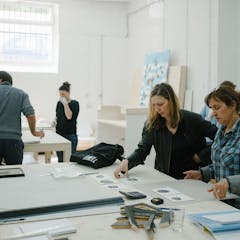
Articles on coworking
Displaying all articles

Are the best co-workers really the ones with four legs and a tail? Science says it depends.

COVID-19 has forced many of us to do the daily shift from home. An anthropologist who observed a group of remote workers raises some concerns and shares some tips.

Adam Neumann both controlled and managed the co-working company he founded in 2011. A finance scholar explains why that can be a serious problem in venture capital-backed startups.

More than 320 coworking spaces were identified in the regions studied during the COWORKMed project.

Digital nomadism and van life lie at the heart of today’s work aesthetics. These trends may create liminal experiences within job markets

Rather than just catering to one stereotype of worker, people who use coworking spaces actually come from different backgrounds, professions and ages.

What do these new places tell us about the transformations of our professional, social and political world? And how to turn them into springboards for territorial development?

Cities seeking to attract creative industries have relied heavily on the cluster concept. New research suggests a technology-driven transformation of how the sector works calls for a new approach.

If you could work from anywhere, where and how might you live?

Coworking is on the rise, but the jury’s still out on whether or not it’s a good thing.

From a single collaborative workspace in San Francisco in 2005, coworking has ballooned into a popular movement, with an estimated 3,000 spaces around the world. Tim Butcher and Julian Waters-Lynch explain…

From humble beginnings, the coworking movement has exploded to an estimated 3000 spaces around the world, with hundreds of thousands of people choosing to ditch the home or corporate office in favour of…
